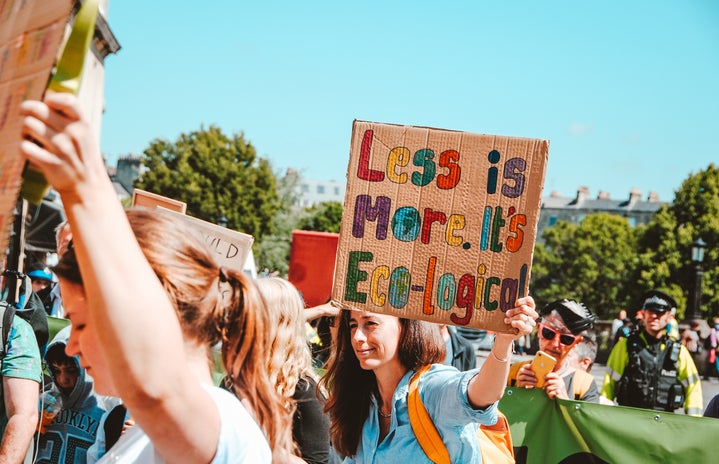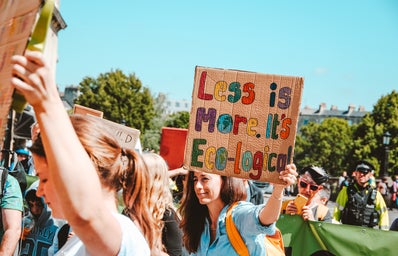‘Mother Earth’ suffers the consequences of patriarchy just the same as any of her daughters. Achieving equity for women and justice for the environment should not come at the expense of the other. This belief is how the term ‘ecofeminism’ was born. But how do feminism and environmentalism work together to achieve joint justice for these two worthy causes?
A Brief History of Ecofeminism
Let’s start with a brief history of ecofeminism to set the foundation for the rest of this article. Ecofeminism (also known as ecological feminism) is a branch of feminism that examines the relationship between women and nature. The term was first coined by French feminist, Françoise d’Eaubonne, in 1974 and first gained popularity following a series of workshops in the United States in the late 1970s and early 1980s. These workshops discussed how feminism and environmentalism could be combined to promote respect for both women and the planet. They also highlighted the similar depictions of women and nature as “chaotic” and “irrational” entities and how associating women with nature lead to the oppression of both. So why does the common association of nature and women have harmful implications for both parties?
Nature and Femininity
It’s no mystery that women are oppressed in society, but what does nature have to do with this? Surely trees don’t push gender roles and the ocean doesn’t partake in lowly, sexist discourse? Ultimately, it has nothing to do with nature itself but the rhetoric of “women being bonded with nature” that is so often pushed by the patriarchy. This notion of a feminine connection to nature dates back centuries (think of Gaia in Greek mythology – the personification of Earth) and still impacts how society perceives women today. By closely associating femininity with nature, we justify potentially harmful stereotypes by saying they are “biologically true”. For example, we often believe that women are inherently nurturing and motherly; it is their “biological destiny” to care for others. Casual use of symbols such as ‘Mother Earth’ can perpetuate the idea that women serve the sole purpose of being carers in society. In addition, this idea of “biological destiny” erases the many nuances of queer identities and queer interpretations of femininity. An association with nature can negatively impact the perception of women in society, so the reverse must also be true. By labelling nature as a feminine entity, society is led to believe we hold power over it. If men have power over women, then surely, they must have domination over nature and its feminine essence too? And this brings us back to the villain of almost every feminist story (and as we now know, environmentalist ones too) – the patriarchy.
Nature, Femininity and the Binary
Patriarchy – the thing we all love to hate. Patriarchy is a hierarchical structure based on the binary and using it to assign more value to one side than the other. This binary can be applied to both feminist and environmentalist contexts; men have power over women and humans have power over nature (as discussed previously). These explicit binary definitions, oppositions and hierarchical ways of thinking allow for disproportionate value to be assigned to one group over another. Patriarchy creates constructs that normalise and allow for violent, oppressive acts against women and the natural world such as housewifisation and hunting. Many ecofeminists argue that “the treatment of women in society is a likely indicator of the treatment of the earth and vice versa” – by oppressing women we also destroy nature.
Environmentalism and Feminism Acting Together
There must be a basic understanding that associating women with nature and vice versa can negatively impact both parties. However, associating feminism and environmentalism has quite the opposite effect. Ecofeminism has fielded its fair share of criticisms over the years and some of them deservingly so. For example, it has historically been criticised for failing to take an intersectional stance, ignoring how BIPOC women and queer people are disproportionately affected by patriarchy and the climate crisis. While the movement still has a long way to go regarding inclusivity, it has acted as a great foundation for environmental justice and elevating women in society. Putting women in positions of authority, specifically in policy-making, leads to greater importance placed on climate issues and more action taken in combatting the climate crisis. Furthermore, women feel more empowered and inspired to make positive change. When 80% of those displaced by climate change are women and girls, it is of utmost importance their voices are heard in spaces for climate action.
As far as feminism and our struggle with the climate crisis are concerned, ecofeminism is still a young social movement. Moving forward, we must think critically about how climate change is not a ‘gender neutral’ issue and how we can use ecofeminism to save our planet and empower women. As ecofeminism evolves, hopefully, it takes on a more intersectional perspective, allowing the voices of the BIPOC and queer communities to be amplified when expressing concern and ideas for change in combatting the climate crisis. Ultimately, without feminism, we cannot effectively and positively impact climate change. It’s ecofeminism for a better, safer, more stable future on Planet Earth.


